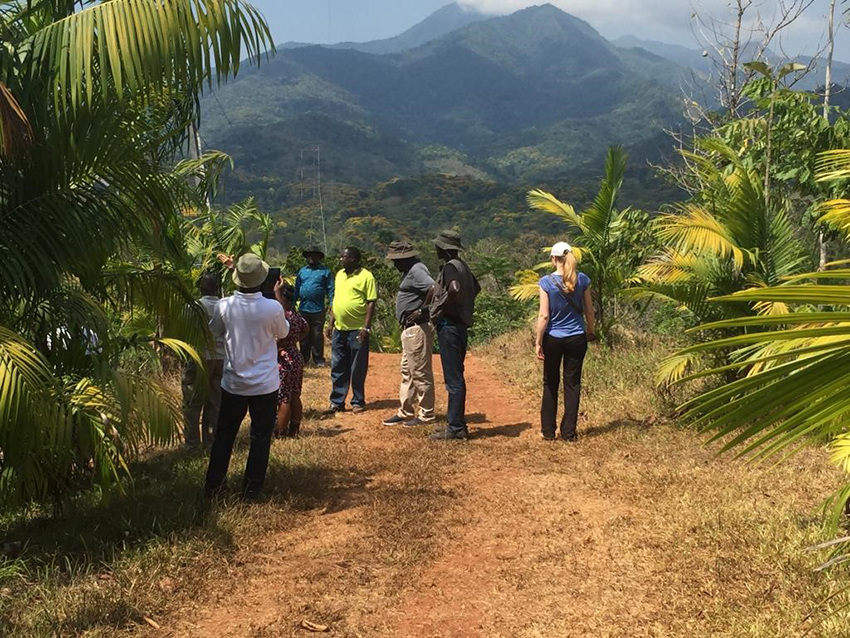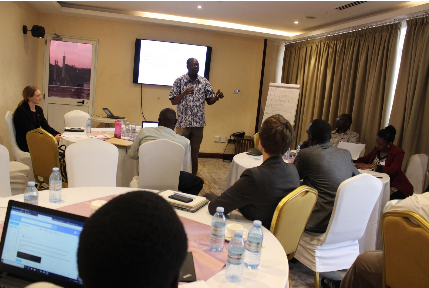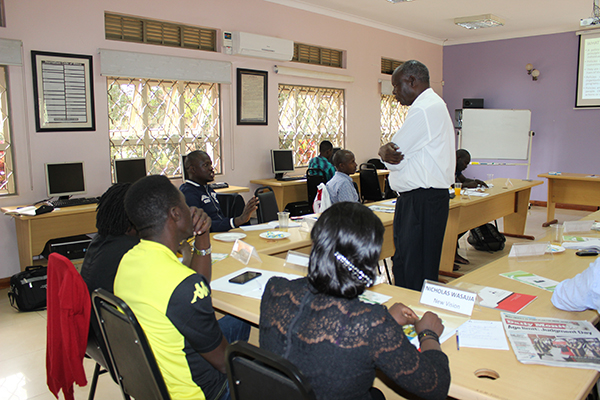AfrII partakes in the high-level South-South Policy Exchange to Costa Rica
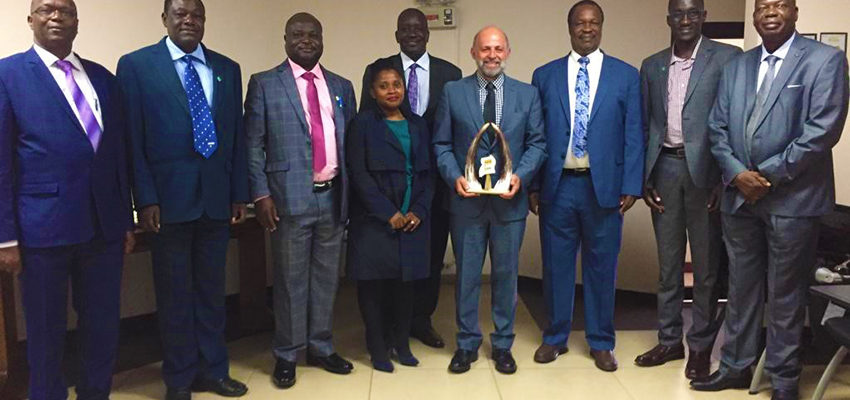
Uganda’s delegation led by Hon. Sam Cheptoris, Uganda’s Minister for Water and Environment (3rd right) in a photo with Hon. Carlos Manuel Rodriguez, Costa Rica’s Minister of Environment and Energy. Also in the photo is Prof. Otim-Nape, the AfrII Chairman (Right), Dr. Peter Alele, the CI/Vital Signs Africa Field Director (2nd right) and other key officials from Uganda.
The just concluded six-day High-level South-South Policy exchange (March 28-April 7, 2019) that was organized by Conservation International attracted 8 delegates from Uganda to learn directly from the Costa Rican experience in implementing a variety of sustainable development policies and discuss which approaches can be applied in the Uganda context.
Among the delegation was the AfrII Chairman Prof. G.W. Otim-Nape; Hon. Sam Cheptoris Uganda’s Minister for Water and Environment (MoWE); Mr. Alfred Okidi-the Permanent Secretary MoWE; Mr. Pius Wakabi Kasajja, the Permanent Secretary for the Ministry of Agriculture, Animal Industry and Fisheries (MAAIF); Dr. Tom Okello Obong, the Executive Director of the National Forestry Authority (NFA) and Mr. Mike Butseya Maliro the Regional Manager for Western Region at the Uganda Coffee Development Authority (UCDA).
The delegation met with Costa Rica’s Minister for Environment and Energy, Mr. Carlos Manuel Rodriguez and other key government officials on the country’s approaches to ecotourism, financing conservation efforts and managing forests and farms in the same landscape.
From the discussions, the delegation was impressed by how Costa Rica uses ecotourism as a driver to integrate sustainable practices that have enabled a positive environment for her communities and tourists; and realized the need by Uganda to borrow a leaf from Costa Rica and adopt strong policy frameworks and implementation for effective environmental conservation including community forest management and restoration of degraded lands, and Institutional, legal and financial reforms relevant to conservation, including approaches to eco system valuation.
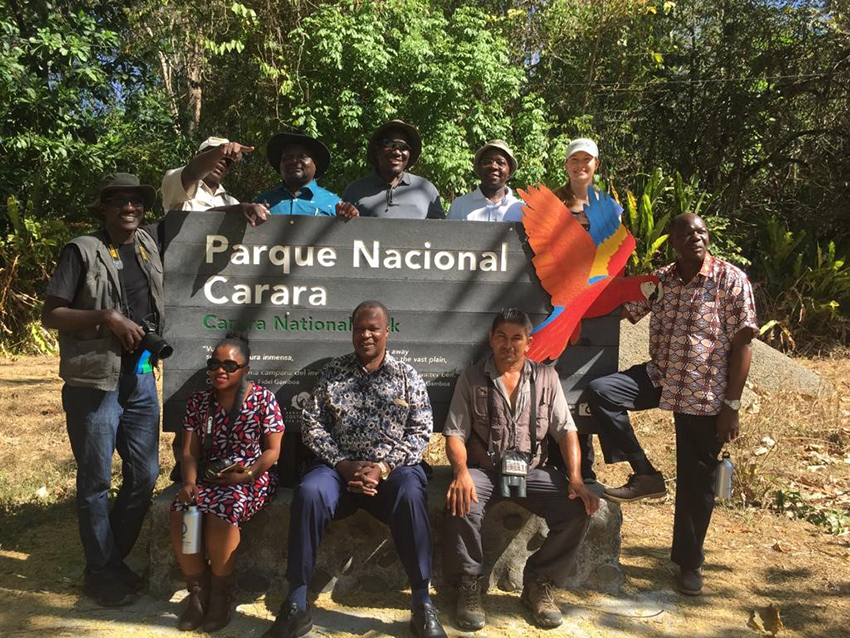
The delegation in pictures after a nature walk in the tropical forest and national park of Costa Rica.
AfrII and Partners push for an integrated data system to achieve sustainable development in Uganda
AfrII in partnership with Conservation International (CI) successfully convened the “Essential Ecosystems for Climate and Sustainable Development” meeting that was held on Tuesday 6th November 2018 at Golden Tulip Hotel in Kampala, for stakeholders to identify and recommend opportunities for incorporating ecosystems into national and sub national planning for climate change and sustainable development in Uganda.
The purpose of the meeting was to present highlights of the findings on a study jointly conducted by AfrII and CI on Uganda’s NDCs and get stakeholder feedback after they review the findings.
“We carried out this work through close engagement with you as key stakeholders and partners. We therefore need you all to engage in assessing the results so as to get your views and thoughts on whether it is relevant and also look into how it can be applied and what more is needed because this is important work for the country since Uganda depends a lot on agriculture” said Dr. Peter Alele, the Africa Field Director at Conservation International, while addressing the participants.
The meeting objectives were to; discuss the importance of natural capital in development and climate change, share research on natural capital mapping and policy gaps, identify strengths and weaknesses of natural capital approach and Articulate next steps for addressing information and policy gaps.

CI’s Dr. Pamela M. Collins (standing) presents to stakeholders’ findings on the role of forests in climate and sustainable development
Meanwhile, The AfrII Chairman Prof. William Otim-Nape mentioned the need for a data integration process to improve data sharing among government departments and the private sector. “Data is essential as a basis for policy decisions but it remains scattered across government institutions and private companies and users cannot readily access it. It is important therefore that we have an integrated data system to have the available data sourced for by the different institutions placed into this common pool to be readily and easily accessible by anyone in order to achieve sustainable development.”
The meeting was attended by various stakeholders including officials from the Ministries of Agriculture, Water and Environment, The National Environment Management Authority (NEMA), National Forestry Authority (NFA), National Agricultural Research Organization (NARO), Uganda National Bureau of Statistics (UBOS), Makerere University, selected NGOs, private sector and international development partners.
Journalists urged to report more on agriculture to trigger total transformation of the sector
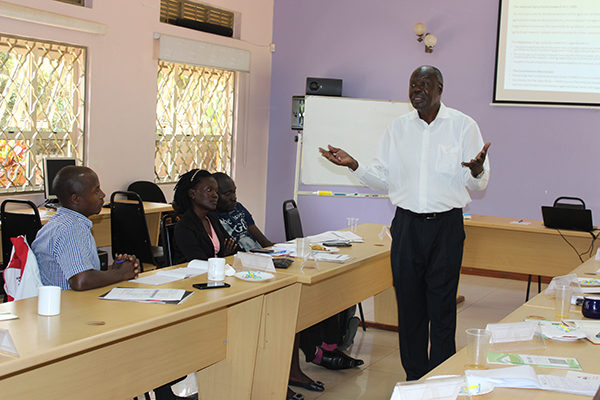
Prof Otim-Nape emphasizes to journalists their key involvement in transforming Uganda’s agricultural sector through continuous reporting on the issues about the sector
The Africa Innovations Institute (AfrII) Chairman, Prof. George William Otim-Nape has called on Journalists in Uganda to sensitize and mobilize farmers and other practitioners to adopt modern agricultural practices and urge these to view farming as a business not a hobby. He said that there is need to report more on agriculture so that people can have food on the table. “Media has a key role to change people’s mindset to move away from subsistence agriculture and focus on commercial agriculture.” Says Nape.
He made the remarks this morning when giving an overview of Uganda’s Agricultural Policy and Management: An expert talk at the public policy reporting workshop for journalists at the African Centre for Media Excellence hub in Bunga, kampala.
He also asked them to mobilize youths for attitude and mind-set change in favor of engaging in gainful employment in the agricultural value chains, as well as mobilize the masses on the need for responsible use of the natural resource base so as to achieve sustainable utilization for the current and future generations in endlessness.
Professor Nape emphasized that the media needs to understand and appreciate the critical role of the agricultural sector in societal and economic transformation and mobilize the citizens for actions to transform the sector. “As media, you should have a holistic examination of the sector’s challenges, the causes of the failing performance of the sector and advocate for putting in place effective policy, strategies, structural measures and programmes required to get the sector on accelerated growth and transformation”
The media are supposed to play a critical role in the policy process. Journalists can flag problems that require attention, weigh policy options that could be considered broader decision-making to include a diversity of voices from citizens and interest groups, inform the public about what is at stake, as well as evaluate the implementation policy.
The agricultural sector is key to the economy. It employs about 80% of the general population and contributes over 68% of the country’s export earnings. Still, the sector has registered poor performance in the last three decades and has not been able to adequately meet the food and nutritional needs of the people of Uganda.
This calls for a lot more efforts to revolutionize the agricultural sector as the nation strives to achieve Vision 2040.
Crop scientists initiate climate smart innovations to improve simsim (sesame).
 Sesame has small nutritious seeds, is a very important oil crop, and is valued for its high quality oils (44% to 52%). However, despite its high value and potential, sesame has received less development attention with its Production characterized by low yields and low productivity. This is as a result of the impact of frequent extreme weather events (droughts, unpredictable seasons, or too much rainfall). Use of traditional varieties and management practices, Poor pests and diseases control practices, declining soil fertility, Pre and post-harvest losses are other factors affecting the crops productivity.
Sesame has small nutritious seeds, is a very important oil crop, and is valued for its high quality oils (44% to 52%). However, despite its high value and potential, sesame has received less development attention with its Production characterized by low yields and low productivity. This is as a result of the impact of frequent extreme weather events (droughts, unpredictable seasons, or too much rainfall). Use of traditional varieties and management practices, Poor pests and diseases control practices, declining soil fertility, Pre and post-harvest losses are other factors affecting the crops productivity.
In Uganda, about 250,000 smallholder farmers are engaged in sesame production with about 101,000 Mt from an area of 176,000 ha. The biggest percentage of this production, 93.7% is realized from northern Uganda.
It is therefore against such background that crop scientists led by the Africa Innovations Institute (AfrII) formed an alliance to introduce the Sesame Project dubbed -Stabilizing Sesame Yields and Production in the Lango Region- Northern Uganda, that aims at improving livelihoods of the Simsim (Sesame) farmers.
Through this research focused project, drought tolerant sesame varieties have been evaluated and released and also innovations in gall midge and webworm control have been effected. The released clean materials are taken to farmer’s fields for comparison with the farmer seed/local variety.
“When you compare, Yield, from the released varieties outstands that from the local farmers’ variety. The local variety also succumbs very much to webworm which is why our research on the Sesame crop is very important because the improved varieties are tolerant to drought and also resistant to pest and diseases” says the Sesame Project Coordinator, Mr. Francis Alacho from the Africa Innovations Institute (AfrII).
Experimental trials have been conducted and released varieties of Simsim2 and 3 (Sesim 2 and 3) distributed to farmers to give them chance to select among the released varieties which is most suitable for them. They are then to compare the performance and make a selection that they will adopt basing on the crop yield and resistance to pests and diseases.
“We have extended our research on the Simsim (Sesame) crop to the farmers so that they can own it for their benefit. When they are part of the whole process, they get to appreciate and embrace new technologies and innovations for better farming. They will also closely monitor the performance of the crop when on the field and see what it in turn gives them, when they harvest” adds Mr. Alacho
8 host farmers for the experiments that were conducted mid 2016 last year, were selected from the different parts of Otuke, Lira and Amolatar Districts, the Project operation areas.
On the different trial plots, some were treated with fungicides (spray) while the fertilizer trials were for evaluating different fertilizer rates to establish which rates/ combination of fertilizer gives better /high yields (these different fertilizers are used at different combinations).
The Sesame project is a consortium comprising of the National Semi Arid Resources Research Institute (NaSARRI), Uganda Oilseeds Producers and Processors Association (UOSPPA), FICA Seeds Ltd and Africa Innovations Institute (AfrII) as the lead implementer.

